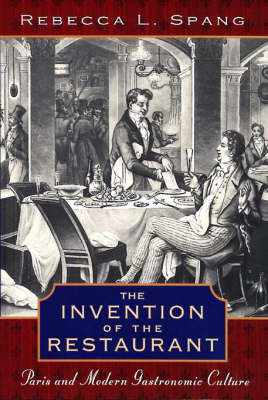
The Invention of the Restaurant
Paris and Modern Gastronomic Culture
Seiten
2000
Harvard University Press (Verlag)
978-0-674-00064-3 (ISBN)
Harvard University Press (Verlag)
978-0-674-00064-3 (ISBN)
- Titel ist leider vergriffen;
keine Neuauflage - Artikel merken
Why are there restaurants? This text is about the French Revolution in taste and of the table - about how Parisians invented the modern culture of food, thereby changing their own social life and that of the world.
Why are there restaurants? Why would anybody consider eating to be an enjoyable leisure activity or even a serious pastime? To find the answer to these questions, we must accompany Rebecca Spang back to France in the 18th century, when a restaurant was not a place to eat but a thing to eat: a quasi-medicinal bouillon that formed an essential element of pre-Revolutionary France's nouvelle cuisine. This is a book, about the French revolution in taste and of the table - a book about how Parisians invented the modern culture of food, thereby changing their own social life and that of the world. During the 1760s and 1770s, those who were sensitive and supposedly suffering made public show of their delicacy by going to the new establishments known as "restaurateurs' rooms" and there sipping their bouillons. By the 1790s, though , the table was variously seen as a place of decadent corruption or democratic solidarity. The revolution's tables were sites for extending frugal, politically correct hospitality, and a delicate appetite was a sign of counter-revolutionary tendencies. The restaurants that had begun as purveyors of health food became symbols of aristocratic greed.
In the early 19th century, however, the new genre of gastronomic literature worked within the strictures of the Napoleonic police state to transform the notion of restaurants and to confer star status upon oysters and champagne. Thus, the stage was set for the arrival of British and American tourists keen on discovering the mysteries of Frenchness in the capital's restaurants. From restoratives to restoration, Spang established the restaurant at the very intersection of public and private in French culture - the first public place where people went to be private.
Why are there restaurants? Why would anybody consider eating to be an enjoyable leisure activity or even a serious pastime? To find the answer to these questions, we must accompany Rebecca Spang back to France in the 18th century, when a restaurant was not a place to eat but a thing to eat: a quasi-medicinal bouillon that formed an essential element of pre-Revolutionary France's nouvelle cuisine. This is a book, about the French revolution in taste and of the table - a book about how Parisians invented the modern culture of food, thereby changing their own social life and that of the world. During the 1760s and 1770s, those who were sensitive and supposedly suffering made public show of their delicacy by going to the new establishments known as "restaurateurs' rooms" and there sipping their bouillons. By the 1790s, though , the table was variously seen as a place of decadent corruption or democratic solidarity. The revolution's tables were sites for extending frugal, politically correct hospitality, and a delicate appetite was a sign of counter-revolutionary tendencies. The restaurants that had begun as purveyors of health food became symbols of aristocratic greed.
In the early 19th century, however, the new genre of gastronomic literature worked within the strictures of the Napoleonic police state to transform the notion of restaurants and to confer star status upon oysters and champagne. Thus, the stage was set for the arrival of British and American tourists keen on discovering the mysteries of Frenchness in the capital's restaurants. From restoratives to restoration, Spang established the restaurant at the very intersection of public and private in French culture - the first public place where people went to be private.
Rebecca L. Spang is Lecturer in Modern European History at University College London.
Introduction: To Make a Restaurant 1. The Friend of All the World 2. The Nouvelle Cuisine of Rousseauian Sensibility 3. Private Appetites in a Public Space 4. Morality, Equality, Hospitality! 5. Fixed Prices: Gluttony and the French Revolution 6. From Gastromania to Gastronomy 7. Putting Paris on the Menu 8. Hiding in Restaurants Epilogue: Restaurants and Reverie Notes Acknowledgments Index
| Erscheint lt. Verlag | 3.4.2000 |
|---|---|
| Reihe/Serie | Harvard Historical Studies ; No. 135 |
| Zusatzinfo | 27 halftones |
| Verlagsort | Cambridge, Mass |
| Sprache | englisch |
| Maße | 155 x 235 mm |
| Gewicht | 608 g |
| Themenwelt | Reisen ► Hotel- / Restaurantführer ► Europa |
| Geschichte ► Allgemeine Geschichte ► Neuzeit (bis 1918) | |
| Geisteswissenschaften ► Geschichte ► Regional- / Ländergeschichte | |
| Sozialwissenschaften | |
| ISBN-10 | 0-674-00064-1 / 0674000641 |
| ISBN-13 | 978-0-674-00064-3 / 9780674000643 |
| Zustand | Neuware |
| Haben Sie eine Frage zum Produkt? |
Mehr entdecken
aus dem Bereich
aus dem Bereich
Europa 1848/49 und der Kampf für eine neue Welt
Buch | Hardcover (2023)
DVA (Verlag)
48,00 €
Giordano Bruno - ein ketzerisches Leben
Buch | Hardcover (2024)
C.H.Beck (Verlag)
29,90 €
Kunst und Gesellschaft an der Schwelle zur globalen Welt
Buch | Hardcover (2024)
Klett-Cotta (Verlag)
42,00 €


